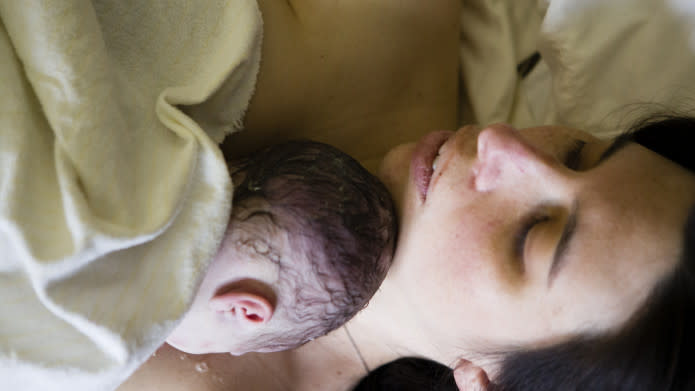Hot New Birthing Trend Is Just a Little Bit Dirty

A decidedly “crunchy” birthing practice is finally becoming mainstream, with some new research to back it up.
In what many consider to be a new childbirth trend, right alongside eating during labor and delaying cord clamping, new moms are opting to delay baby’s first bath — sometimes, for a few days after birth. In the past few years, delayed bathing has been popping up as a hot topic on birthing forums like What to Expect and The Bump.
More: Adorable early-walker shoes for babies that won’t hurt their feet
A growing number of moms are choosing to leave the vernix (the waxy, white coating on a newborn’s body) on a baby after birth to improve after-birth bonding and to offer an easier transition into breastfeeding. Some moms who adopted the no-bathing practice said that their babies smelled “wonderful” and held off on that first bath for up to four days.
Are these new moms just lazy, or do they know something we don’t? We asked a few experts to weigh in on any potential benefits of waiting to give a baby their first bath.
The advantages of skipping Baby’s first bath
Great news for the moms who don’t have “bathing a baby” at the top of their new parent to-do list: Experts say there are a few medical benefits to holding off on a baby’s first bath. But before we dig right into the research, it helps to understand a little more about the vernix — that cheese-like coating that babies are born with on their skin.
More: 8 Things no one tells you pregnancy will do to your vagina
Vernix begins to cover a baby in the womb at 18 weeks into pregnancy, and it has a very specific purpose. Vernix, made of the oil and skin cells that slough off a baby’s skin in utero, helps to protect a baby inside and outside of Mom’s oven. In the womb, vernix can moisturize a baby’s skin and make it easier to slide out of the birth canal. Outside of the womb, vernix can conserve heat after birth and seal a baby’s delicate skin from the outside world.
“It’s like a fatty cream that absorbs into the skin if not wiped off,” says Dr. Aaron Rossi, a private practice chiropractor in Covington, Georgia. He continues, “When you think about it, amniotic fluid evolved as the ideal environment to grow a baby in, so is it really that bad to keep it on the new baby’s skin a little while? The amniotic fluid that is left on the baby will positively influence the proper amounts and proper production of vitamin K — removing the importance of the after-birth vitamin K shot. How? The amount and type of friendly bacteria living on us and in us, called the microbiome, is of crucial importance to human health. And it’s the bacteria living in our gut that produces much of the vitamin K we need. The amniotic fluid, remaining on the skin until dry, positively influences our microbiome.”
Choosing not to wash babies after birth is not a new concept, according to Laurie MacLeod. MacLeod says that in her work as a midwife at the Ohio State University Wexner Medical Center, she’s seen parents wait at least 12 hours or longer to bathe their newborn for the first time. Putting off the first bath is normally done to minimize separation between mother and baby at the hospital and to stabilize a newborn’s temperature after birth. And of course, there are health benefits too. MacLeod explains, “The vernix does not need to be wiped or washed off. It has been shown to contain immunities in it to help strengthen Baby’s immune system and helps to keep the skin nicely moisturized. It can just be rubbed off by the parents.”
More: Crowd-birthing is the latest childbirth trend and it sounds like hell
For Kay Johnson, CNM at Atlanta Birth Care, it’s this mother-baby bonding benefit that is one of the biggest. Johnson points out that research published just weeks ago, to be presented at the American Academy of Pediatrics National Conference & Exhibition, shows that immediate skin-to-skin contact after birth (putting off that first bath) can help to relieve maternal stress after labor. Johnson says, “Bathing the baby involves separating the mother and baby during the first critical hours that also affect bonding and milk stimulation and perhaps more subtle postpartum events like normal uterine activities that control bleeding.”
How long is too long to wait?
Holding off on a baby’s first bath for all of the benefits mentioned above is all fine and good, but when is the time right to first introduce your baby to water? Some mothers chose to wait for more than half a week after birth. MacLeod says some of her patients wait anywhere from 12 hours to several days to bathe their babies.
More: What’s the deal with orgasmic birth?
And for Dr. Rossi, he practices what he preaches — all of his four children were born at home, and the amniotic fluid was left on until it absorbed and dried on its own. His children were first bathed with Mom after the vernix had dried completely. Rossi describes the experience as “peaceful, happy, completely non-dramatic.”
Like many other aspects of the birthing process, waiting to bathe a baby is ultimately a decision parents will have to discuss with their doctor and make for themselves. From a pediatrician’s perspective, Dr. Deepak Patel of the online health portal iCliniqsays he doesn’t see a reason why a baby should be bathed right after birth. He advises, “I think that a time period of at least six hours in a hot climate and at least 24 hours in a cold climate should be given to the child for bathing.”
Hey, it’s doctor’s orders.
(Photo: Buzz Productions/iStock/Getty Images Plus)
